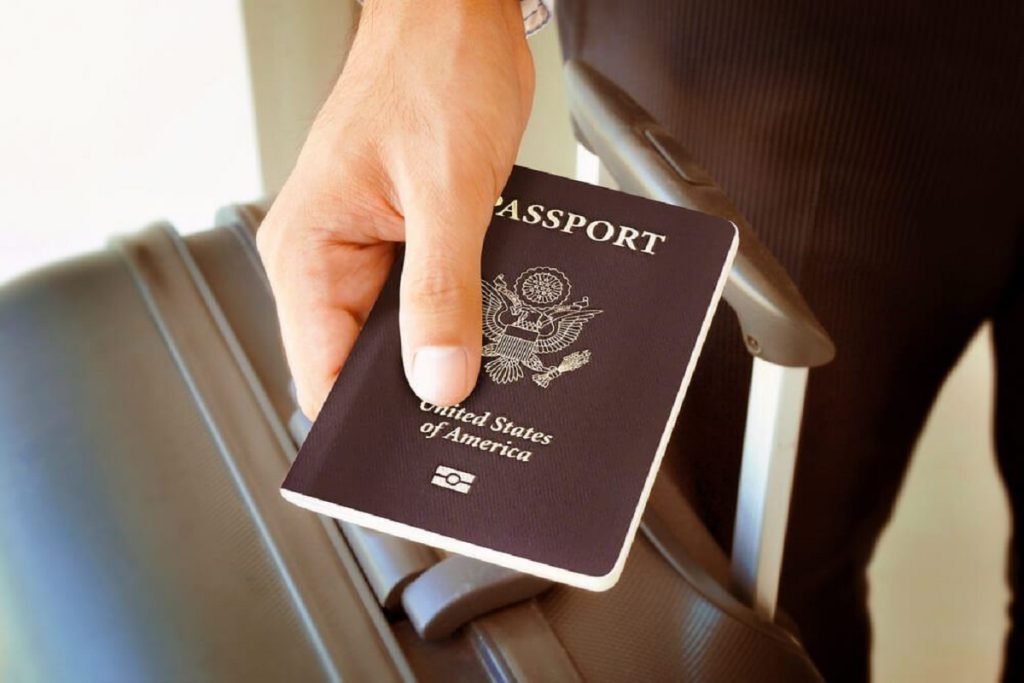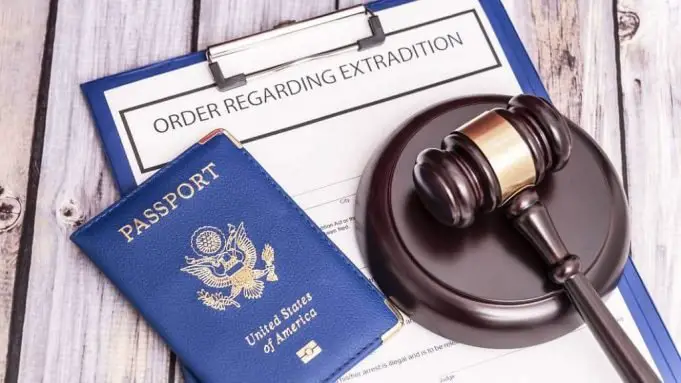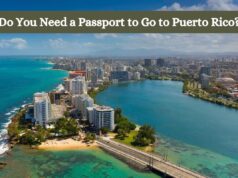A felony conviction comes with significant losses, including your rights, liberties, and often your profession.
While the immediate repercussions, such as jail time and probation, are evident, the subtler consequences—like being stripped of voting rights and restricted international mobility—can deeply affect those with a criminal history. This raises the question: Can you get a passport with a felony conviction?
In reality, merely having a felony doesn’t automatically prevent you from securing a passport. However, specific convictions and situations might. It’s essential to understand what could disqualify you, which nations restrict entry for felons, and the avenues available for potentially clearing your record.
Background
A passport, at its core, is an official government document that certifies the identity and nationality of its holder, primarily for the purpose of international travel. It allows citizens to prove who they are outside of their home nation and serves as a request to foreign governments to allow the bearer to pass freely and safely.
In the United States, the responsibility of issuing passports falls under the U.S. Department of State. This federal agency not only grants, issues, and verifies passports for U.S. citizens and nationals but also sets the policies and criteria for eligibility. While the focus here is on the U.S., it’s essential to recognize that each country has its relevant body responsible for passport issuance and its specific rules.
Can You Get a Passport with a Felony? The Basic Rule
Now, when it comes to felons and passport eligibility, here’s the basic rule: In the U.S., having a felony conviction does not, in itself, prevent an individual from obtaining a passport. However, certain types and circumstances of convictions can result in a temporary or even permanent ban on passport issuance.
While many believe that a felony record immediately disqualifies one from passport eligibility, that’s a misconception. The nuances lie in the nature of the felony and any associated restrictions tied to the individual post-conviction.
Related: Can a Felon Get a Passport
Specific Circumstances Where a Felon Might be Denied a Passport
Navigating the world of passports for felons requires a keen understanding of the specific circumstances that can serve as barriers. Here are some situations where felons might find their passport applications denied:
Felons Convicted of Drug Trafficking Across International Borders: A conviction related to drug trafficking, especially when it involves crossing international borders, can lead to passport eligibility being revoked. The severity of the crime, coupled with its international nature, flags the individual as a potential risk for further international criminal activity.
Unpaid Child Support Cases: Surprisingly, unpaid child support can impede the ability to obtain or renew a passport. If a person owes $2,500 or more in child support, the U.S. Department of State may deny their passport application until the matter is resolved.
Certain Probation, Parole, or Release Conditions: The terms of probation, parole, or post-release can include travel restrictions. If an individual’s conditions prevent international travel or even leaving the state, obtaining a passport can be problematic until those conditions expire or are lifted.
Outstanding Federal Warrants: Felons with unresolved federal arrest warrants can face a denial when they apply for a passport. The government sees these individuals as potential flight risks.
Unresolved Financial Obligations to the U.S. Government: This includes certain types of loans, taxes, or other financial commitments. Those who owe significant sums might find their passport application put on hold until their debts are settled.
What Countries Don’t Allow Convicted Felons?

Hold on a minute—securing a passport doesn’t guarantee entry to all countries, especially if you have a criminal record.
Numerous countries don’t hesitate to admit felons, but it might be more concise to highlight the ones that do pose restrictions, including:
- United States
- United Kingdom
- Australia
- Canada
- China
- Japan
- New Zealand
- Argentina
- South Africa
- Cuba
- India
- Iran
- Israel
- Kenya
- Macao
- Taiwan
Read More: Publix Passport
Duration of Restrictions
While a felony conviction may initially hinder one’s ability to obtain a passport, it’s crucial to know that these restrictions often have a duration, and they aren’t always permanent.
Can Restrictions be Lifted?: Yes, many restrictions tied to felonies can be lifted over time, especially if they are related to probation or parole conditions. Once these conditions are met or expire, an individual may regain their eligibility to obtain a passport.
Circumstances Under Which a Felon Can Reapply: If the initial passport denial was due to a temporary condition, such as being on probation or having unpaid federal loans, resolving these issues allows for reapplication. Moreover, once the legal obligations are fulfilled, such as completing a sentence, felons can reapply.
International Travel Restrictions and Considerations
Embarking on international travel as a felon comes with its own set of challenges and considerations. It’s important to understand the nuances to ensure a smooth journey.
The Difference Between Having a Passport and Being Granted Entry into Another Country: Holding a valid passport is a ticket to international travel, but it’s only half the equation. A passport allows a traveler to leave and re-enter their home country. However, entering another country is at the discretion of that nation. This means travelers, especially felons, might face additional scrutiny or even denial at the destination country’s immigration checkpoint.
Countries That May Deny Entry to Felons: Some countries, like Canada, have strict rules regarding admitting individuals with a criminal record. Even a DUI conviction can be grounds for denial. It’s vital for travelers to research and possibly contact the embassies of their destination countries to understand entry requirements.
Tips for Traveling Internationally as a Felon:
- Stay Informed: Always check entry requirements before booking a trip.
- Legal Counsel: Consult with an immigration attorney or specialist to understand potential barriers.
- Documentation: Carry all relevant paperwork, including court documents, which might help in addressing questions at border controls.
- Stay Honest: Always be truthful when questioned by immigration officials.
Read Also: A Passport to Global Wellness
Steps to Take If Denied a Passport Due to a Felony
Being denied a passport because of a felony can be discouraging, but it’s essential to remember that there are steps one can take to potentially overturn this decision:
Understanding the Reason for Denial: Before making any moves, ensure you understand the specific reason for the passport denial. The U.S. State Department will provide a written explanation, which can guide subsequent actions.
Seeking Legal Counsel: It’s always a good idea to consult with an attorney who specializes in criminal law or passport and immigration issues. They can offer guidance tailored to your specific situation.
Considering Expungement or Record Sealing: Depending on the state and the nature of the felony, some individuals might be eligible to have their criminal record expunged or sealed. This process can effectively “erase” the felony in the eyes of the law, potentially clearing the way for passport approval.
Applying for a Waiver or an Exception: In some cases, the State Department may grant a waiver or an exception for individuals who demonstrate a compelling need to travel internationally, even if they have a disqualifying felony.
Conclusion
Can You Get a Passport with a Felony? The journey of obtaining a passport and traveling internationally with a felony can be fraught with challenges. From understanding the basic requirements to navigating the complexities of international regulations, the path is not always straightforward. However, with the right information, proactive research, and sometimes a bit of perseverance, it’s possible to overcome these hurdles. For many, the benefits of travel — the learnings, experiences, and personal growth — can far outweigh the challenges. So, for those with a felony, it’s essential to approach travel with responsibility, optimism and informed decision-making. The world, with all its lessons, awaits!
Frequently Asked Questions (FAQs)
What Disqualifies You from Getting a Passport?
Certain circumstances might prevent you from obtaining a passport. If you’re on probation or parole with restrictions against international travel, you might be ineligible for a passport. Additional disqualifying reasons include an active extradition request, an unsealed and valid federal arrest warrant, and more.
Can I automatically be denied a passport if I have a felony?
No, having a felony does not automatically result in a passport denial. However, specific types of convictions, like certain drug-related felonies, can hinder your ability to obtain a passport.
How does a drug-related conviction affect my passport eligibility?
Drug-related convictions, especially those involving international trafficking, can lead to passport denial or revocation. However, if the conviction is for personal possession and is not a felony, it may not impact your passport application.
Can I travel to any country once I get my passport, despite my felony record?
Obtaining a U.S. passport does not guarantee entry into another country. Each country has its own rules regarding travelers with criminal records. Some countries, like Canada, can deny entry even for past misdemeanors.










![What Does Aviates Stand for in Aviation? [The Art of Flying] Aviates](https://tourinplanet.com/wp-content/uploads/2024/07/Aviates-100x75.jpg)














![25 Best Peruvian Foods You Must Try In Peru [With Recipes] Peruvian Food](https://tourinplanet.com/wp-content/uploads/2024/07/Peruvian-Food-100x75.jpg)


